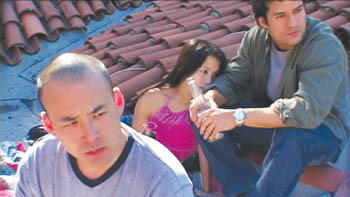![[Metroactive Movies]](/movies/gifs/movies468.gif)
[ Movies Index | Show Times | Silicon Valley | Metroactive Home | Archives ]
Joy Division
Director Eric Byler talks about his $21,000 miracle, 'Charlotte Sometimes'
By Todd Inoue
WRITTEN and directed by Eric Byler, Charlotte Sometimes (yes, named after the Cure song) captures the in-between days of relationships on the ups or on the outs. Lori (Eugenia Yuan) and Michael (Michael Idemoto) share a duplex as well as a hidden attraction to each other.
Lori's boyfriend, Justin (Matt Westmore), is a self-obsessed piece of work. After loud love-making sessions that Michael can't escape hearing through the thin walls, Lori retreats upstairs to his abode for nonsexual, post-coital pillow talk. They chat, flirt and watch anime videos, to Michael's growing consternation. When a sexy and mysterious stranger named Darcy (Jacqueline Kim) shows Michael some attention and brings everyone together in a series of uneasy gatherings, Charlotte Sometimes gets its legs and stands erect as a powerful and emotional art flick.
The movie moves at a leggy, languid pace with sharp characters seemingly plucked from an Adrian Tomine graphic novel and imbued with guarded sensuality. Idemoto anchors the film as a Camus-reading mechanic torn between the woman he secretly adores and the woman passing through. Kim is equally delightful and infuriating as the monkey wrench thrown into the bizarre love triangle.
Byler surprises with subtle charms, conveying drama and intimacy with simple dialogue, improv and deafening silence. The characters' afterimage lingers long after Kim's acoustic cover of the Cure song ushers out the reel; the film produces enough sexual tension to power a small island and fuel hours of cafe discussion.
"I love it when people leave the theater talking about the characters as if they're real people, accusing them, indicting them, defending them as if they're real, forgetting the fact that some guy wrote and directed it," Byler says.
That "some guy" is Eric Byler, in town for a quick press junket. He shot Charlotte Sometimes on digital video and blew it up to 35 mm. It's a $21,000 credit card miracle. Byler--who is half Chinese--shows Asian Americans exploring relationships, masculinity and eroticism within an art-film format.
As in Justin Lin's Better Luck Tomorrow, the characters aren't defined by their racial makeup but by the decisions they make. "I would like to prove that there's a place for art films from the United States and from Asian American actors and directors," Byler says. "It wasn't long ago when we assumed the only reason to make an Asian film was to further a political agenda, and if you weren't furthering the political agenda, you weren't down with 'the cause'--and people still say this to me!"
Byler hopes to build on the success of Better Luck Tomorrow. Last year, both films crisscrossed each other on the festival circuit. Charlotte Sometimes has won more awards than BLT, including an Audience Award at SXSW 2002, a Special Jury Award at Florida Film Festival and Best Dramatic Feature at the San Diego Asian Film Festival. The film was also nominated for two IFP Independent Spirit Awards.
Better Luck Tomorrow's street-marketing team turned moviegoing into a political statement, uniting a community behind a movie with Asian American actors in lead and supporting roles. Byler knows Charlotte Sometimes is the polar opposite of BLT and appeals to a different audience. Directors like Yasujiro Ozu, Tsai Ming-Liang and Fassbinder influenced Byler, thus Charlotte Sometimes is more In the Realm of the Senses than Pulp Fiction.
"We're not making the same plea that it's your duty as an Asian American to see the film," Byler explains. "If it fails, the movement is still alive and well. Justin and [BLT marketing guru] David Magdael have politicized the idea of going to a movie, and there's a groove that's already worn that we can roll down."
Recently, Byler expressed concern when prearranged cable TV and DVD deals for his movie ensured Charlotte Sometimes and Better Luck Tomorrow would open a month apart. Byler and Lin held a 2:30am powwow in a Washington, D.C., Chinese restaurant to clear the air. They came away positive; having two nationally distributed Asian American films released in the same month is a good thing.
"Justin said, 'That would be perfect. When people see Better Luck Tomorrow, they'll want to see more Asian American movies and there'll be one there already,'" Byler recalls. "I'm hoping that will happen."
[ Silicon Valley | Metroactive Home | Archives ]
![]()

Just a Friend: Michael (Michael Idemoto) watches his chicken skewer fall through the barbecue grate as Lori (Eugenia Yuan) and Justin (Matt Westmore) look on in a scene from 'Charlotte Sometimes.'
Charlotte Sometimes (R; 85 min.), written and directed by Eric Byler, photographed by Rob Humphreys and starring Jacqueline Kim, Eugenia Yuan, Michael Idemoto and Matt Westmore, opens Friday at the Towne Theater in San Jose. At the Saturday night 7pm show, Eric Byler and cast members will appear for a benefit screening for the Contemporary Asian Theatre Scene.
Send a letter to the editor about this story to letters@metronews.com.
From the May 8-14, 2003 issue of Metro, Silicon Valley's Weekly Newspaper.